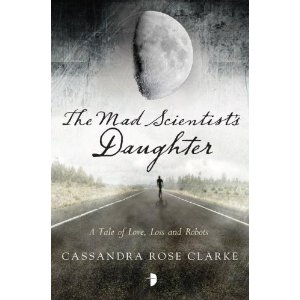
Advance Review: The Mad Scientist’s Daughter by Cassandra Rose Clarke
Written by: Beth Woodward, CC2K Books Editor
 My favorite romances are the ones that have something else going on, some other kind of plot, besides the romance. My favorite science fiction books are the ones that have incredibly complex and well-develop d characters, the ones that use their fantastical plots to add nuance to human problems and failings.
My favorite romances are the ones that have something else going on, some other kind of plot, besides the romance. My favorite science fiction books are the ones that have incredibly complex and well-develop d characters, the ones that use their fantastical plots to add nuance to human problems and failings.
The Mad Scientist’s Daughter had both. Maybe that’s why I liked it so much.
The description, courtesy of the Angry Robot Books website:
“Cat, this is Finn. He’s going to be your tutor.”
He looks and acts human, though he has no desire to be. He was programmed to assist his owners, and performs his duties to perfection. A billion-dollar construct, his primary task now is to tutor Cat. As she grows into a beautiful young woman, Finn is her guardian, her constant companion… and more.
But when the government grants rights to the ever-increasing robot population, however, Finn struggles to find his place in the world.
The plot reminded me a little of the movie Bicentennial Man. (I have not read the original Issac Asimov novel off of which the movie is based.) Fortunately, the book eschews the cheesiness (as well as Robin Williams’ over-the-top Robin Williamsness) in favor of a quieter, more thoughtful plot that ties together Cat, her family, and the android that becomes her tutor.
Cat begins the story as a young girl who is often ignored by her scientist parents. Though Cat always has what she needs physically, emotionally her parents seem to have no idea how to care for a child. When they bring Finn into the family, Cat is initially suspicious and resentful of the formalized lessons she has to take from him. But they slowly begin to bond.
From the beginning, Finn seems capable of feeling at least low-level emotions: loyalty, compassion, concern. His friendship with Cat always seems to be based on genuine emotions. And as Cat grows up, their friendship becomes something more than friendship—though Cat is always concerned that he can’t feel the same way about her that she feels about him.
All of the questions here—what defines humanity, will robots be able to feel human emotion—are well-trodden territory in literature and film. What distinguished this book for me were the characters and the way the book handles the subject. I couldn’t stand Cat at times. She makes some really horrible, hurtful decisions and often acts very selfishly. But her emotions and reactions are understandable given the uncertainty of the nature of her relationship with Finn.
I also really liked the fact that the book doesn’t resolve everything in a pat way. Romances often have the tendency to end with a “happily ever after” ending. But this is a story that is entirely too complex and ambiguous to lend itself to that kind of ending. Clarke avoids that, thankfully, giving us an ending that still leaves a lot of questions and uncertainty.
I’ve been subjecting my reviews recently to the “vacation test.” The books I’m reviewing now I read several weeks ago, while I was on vacation. Now, as I sit down to write the review, how well do I remember it?
This one stuck. And that’s a measure of a good book to me.
I received this book as an e-ARC from NetGalley. The Mad Scientist’s Daughter will be available January 29.
